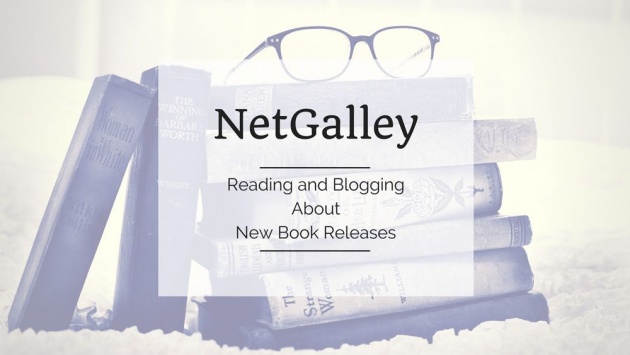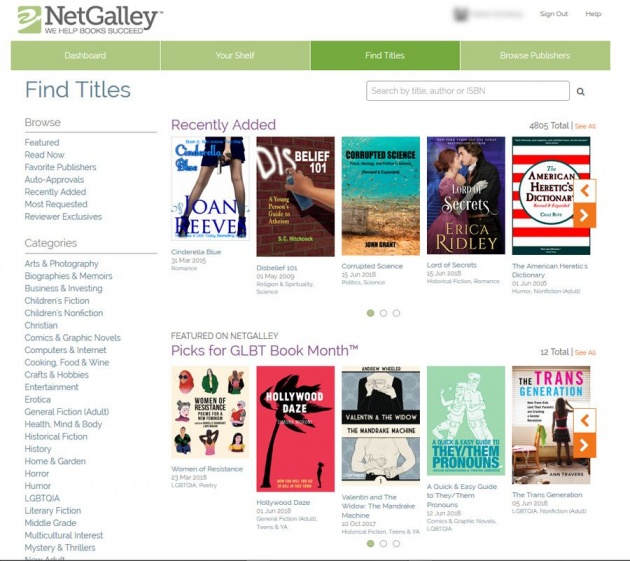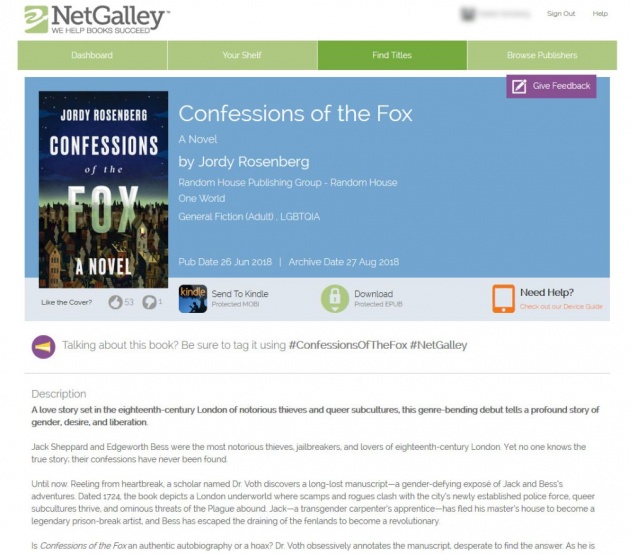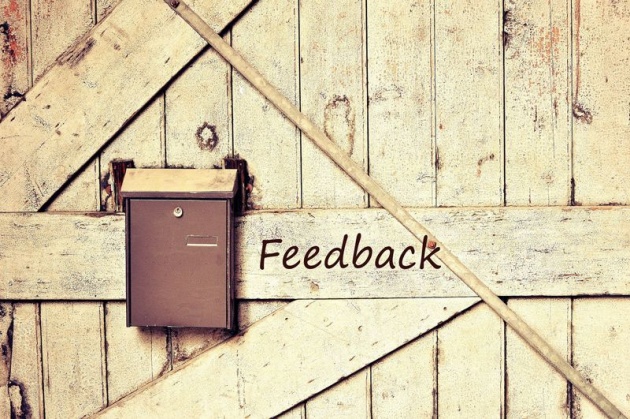
Image credits: Books by jill111 via Canva.com
NetGalley is a website I've been on since 2012, and over these past few years, it's turned out to be a really great source of reading, motivation to post book reviews, and opportunities to spread the news about upcoming books releases. I believe there are quite a few book lovers on bitLanders, and I'm sure that, if they don't know about it yet, then NetGalley could be a great website for them as well.
What is NetGalley?
Read and review
Use NetGalley for free to request, read, and recommend digital review copies before they are published. Your reviews and feedback are essential to publishers, authors, and other readers!
Everyone has influence. Demonstrate your reach through your Profile and your feedback. Librarians and booksellers order and recommend books to their patrons, media professionals interview authors, reviewers and bloggers write about books online and leave reviews on retail sites, and more.
— From NetGalley.com
The idea behind NetGalley.com is for authors and publishers to submit digital ARCs (Advanced Review Copies) of their books (both novels and non-fiction works) soon to be published, for readers to post reviews about them right before or immediately after said books' official release. These ARCs or galleys (sometimes they're even the actual published version) are downloadable for free, which means you get to read all these new releases early, instead of having to wait for them to appear in stores—or, if you don't have a lot of money, to wait for them even longer until someone drops a copy in a charity shop.
Video credits: NetGalley by Bookables via YouTube
What's an ARC?
The main point to keep in mind is that an ARC is not the final copy of a book, therefore the latter's contents are liable to change upon official publishing. However, traditionally, ARCs also correspond to the last preview copy before the book is sent to printing, so they're usually so close to the final version that:
- You may find typos and/or printing layout marks, yet this shouldn't disrupt your reading (too) much.
- The contents won't have changed a lot once the book is out. If you read an ARC of a novel with a romance subplot, for instance, this subplot will still be there at publishing time.
- You have to be careful about quoting from the books. Some publishers will include rules about this, asking you not to quote, to make sure that no deleted text makes its way into a review and misleads a potential reader.

Image credits: Book by Free-Photos via Pixabay.com
Conditions
Of course, there are conditions to using NetGalley, the first one being that you must post reviews afterwards: on Amazon, Barnes & Nobles, Goodreads, Booklikes, and better yet: on your own book reviews blog if you have one. I really do advise having or creating one, by the way, if you want to seriously get into reviewing for NetGalley: most books are uploaded there by publishing houses, and while some are offered under a 'download and read immediately' banner, you still need to request first, and be approved next.

Image credits: Kindle by Free-Photos via Pixabay.com
Publishers have various approval criteria, and you will find youre request rejected if you don't meet them. The usual criteria are:
- You should have a book blog, not just leave a review on Amazon (especially since such sellers won't let you post a review before the book is released). While some publishers will still approve your requests without that, most won't.

Image credits: Social Media by KevinKing via Pixabay.com
- Your feedback ratio should be 80% or more. This means that, if you have requested 100 books in total on NetGalley, you must have reviewed at least 80 of those. As above, it's not mandatory, but it plays an important part for many publishers: the lower your ratio, the lower your chances of approval.
- You must live in the country where the book is going to be published. This is due to publishing rights—the same reason why I sometimes can't buy some Kindle books on Amazon UK, while they are available on Amazon US—but it's not always enforced. In the past, I requested US books and still got approved even though I was living in the UK. Furthermore, NetGalley now has websites for different countries, where your chances of approval are higher. The ones available for now are netgalley.co.uk, netgalley.fr, netgalley.de, and netgalley.jp. Even if you don't live in these countries, though, it's still worth trying (Australian reviewers, for instance, can easily get ARCs through the UK website).

Image credits: UK by TheDigitalArtist via Pixabay.com
- It's appreciated if you link your NetGalley account to your social accounts such as Facebook, Twitter, LinkedIn or Goodreads. I haven't done it because I want to control how I post, not have it done automatically for me; however, I always send publishers the links to my reviews on other websites, so this works, too.
Being rejected
Even if you meet all the criteria I listed, you may still get rejected when you request books. Don't be discouraged by this, and keep in mind there are other factors in play: some publishers plan for a limited amount of copies available, for instance, and when they have granted all of them, they'll reject the remaining requests. Sometimes, it's just a matter of being among the first people to request an ARC...
Furthermore, if you feel you're getting rejected because your feedback ratio is too low, thus locking you in a vicious circle, then sign up for Read Now books: you'll get approved for those automatically, and then you can build up your ratio.

Image credits: Broken Heart by Quicksandala via Pixabay.com
Auto-Approvals
At some point, if you happen to have a good feedback ratio and regularly request ARCs from the same publisher, the latter may decide to add you to their Auto-Approval list. In other words, from now on, any title you request from this publisher, you'll always get approved!
This is a boon in general, and can help rebuilding your ratio, too, if you've fallen behind.
An Average Day on NetGalley
Requesting books
Typically, once registered, you'll get to request your first books.
Don't make the mistake of requesting too many at once, or you may find yourself stuck when it comes to reading and reviewing quickly!
Start with browsing the Find Titles section. I usually do it by category—you can add your favourite genres in the reading preferences part of your profile—and check what's new and what's in the Read Now list for a given genre. Then click on the Request button for the title(s) that interest you.

Image credits: The Find Titles page via NetGalley.com
Your request will be Pending for a while. Some publishers tend to approve or reject requests quickly, others can take weeks. Once a request is approved (but not necessarily if it's rejected), you'll receive an e-mail informing you of the outcome, and inviting you to read and review the ARC.
Be careful, though: publishers may have their own rules in that regard, that they'll detail in this e-mail. A common rule, for example, is that you should post your review within a couple of weeks before the publishing date, but not earlier than that.
My request has been approved, now what?
Now, it's time to download your book! Go to the Your Shelf section, and click on the book's title. You'll be able to do two things: send it to your Kindle (you'll need to add a Kindle account to your profile first), and download an EPUB or PDF file.

Image credits: Approved book and download possibilities, via NetGalley.com
If you want to use the download option, you'll need an Adobe account (it's free), because the ARCs have to be downloaded with ADE (Adobe Digital Editions), and come with DRM (Digital Rights Management).
I strongly recommend having a Kindle account (it's free, too), even if it means only using it through Kindle for PC or the Kindle App on Android and iOS: indeed, when you use the Send to Kindle option, the book remains in your account even after it's been archived. On the other hand, books downloaded with ADE expire after a while, meaning you need to re-download your copy... and this isn't possible anymore after archiving.
Archived?
A book is only available for request and reading up until a certain date (usually, its publication date). After that, you can still submit your review on NetGalley, but you can't download your copy anymore. Hence my above piece of advice about Kindle!
If you read fast and only have requested a couple of books, this won't be a problem, but when you have 15-20 books in your queue, and/or you got approved for an ARC close to its archiving date, I guarantee that sooner or later you'll find yourself in a position when your copy has expired in ADE before you managed to read it. (Should this happen,though, let the publisher know: some might re-send the book to you, and in general, it will also count as a 'review', therefore not shooting down your ration.)
Badges
There are no prizes on NetGalley, since your satisfaction will mainly come from getting to read new books before they're even printed, and to help spreading the word about them. Nevertheless, the website offers badges, that you'll get on your profile once you've fulfilled specific criteria. Among others badges, you'll find:
- 80% feedback minimum badge
- Auto-Approvals badge: you've been auto-approved by 4+ publishers
- Reviews badges: you've posted more than a given amount of reviews (this is an incremental badge—currently, I'm at 200 reviews, aiming for the 500 reviews one!)...
Reviewing
After you're done reading an ARC, it's time to write a review and to post it. My own workflow in that regard is first to write it in Word; then I post it on Goodreads, copy the code I get through that website, and use that code to format the review on my reading blog. I could do the contrary, but I've found this is a method that works well for me (the code generated through Goodreads includes the rating and a thumbnail of the book cover, so I don't have to do that myself).

Image credits: Feedback by MIH83 via Pixabay.com
One word about reviewing: don't be scared of writing critical reviews! I've discussed this with many people who're also using NetGalley, and some are uncomfortable with the idea of leaving anything else than glowing, positive reviewes (4 or 5 stars out of 5). There are many reasons to this: they're scared that publishers won't approve their requests anymore after a 'bad review', or that they'll hurt an author's feelings, etc.

Image credits: Criticism by geralt via Pixabay.com
But let's be honest: good reviews can actually hurt sales! Why? Because a book that only gets 5 stars looks perfect, and perfection is not of this world. After a while, people will become wary of these reviews, thinking they were written by friends of the author, or by sock puppets (accounts created by the authors themselves to post positive reviews).
As proof that it can't hurt you, 1) my approval ratio hasn't declined (and I've posted my share of critical reviews about books I didn't enjoy), and 2) whenever I've received an e-mail telling me that "Your review has helped someone buy this book on Amazon", in every single case, it was for a 3-star or less review, where I listed both the merits and flaws of the book.
So don't hesitate to be honest, both ways, and to explain why you liked this or disliked that. It's what helps the most.
Video credits: NetGalley's Top Tips For Writing a Book Review by NetGalley via YouTube
Conclusion
Do I love NetGalley? Yes, I do! During my time as a member there, I've been able to read so many recent books, that I could never have afforded otherwise! And I also genuinely enjoy writing reviews (they strengthen my bond with the books, if this makes sense). So I can only hope that if you decide to give it a try, you'll love it too!
Written by Naotalba for bitLanders



